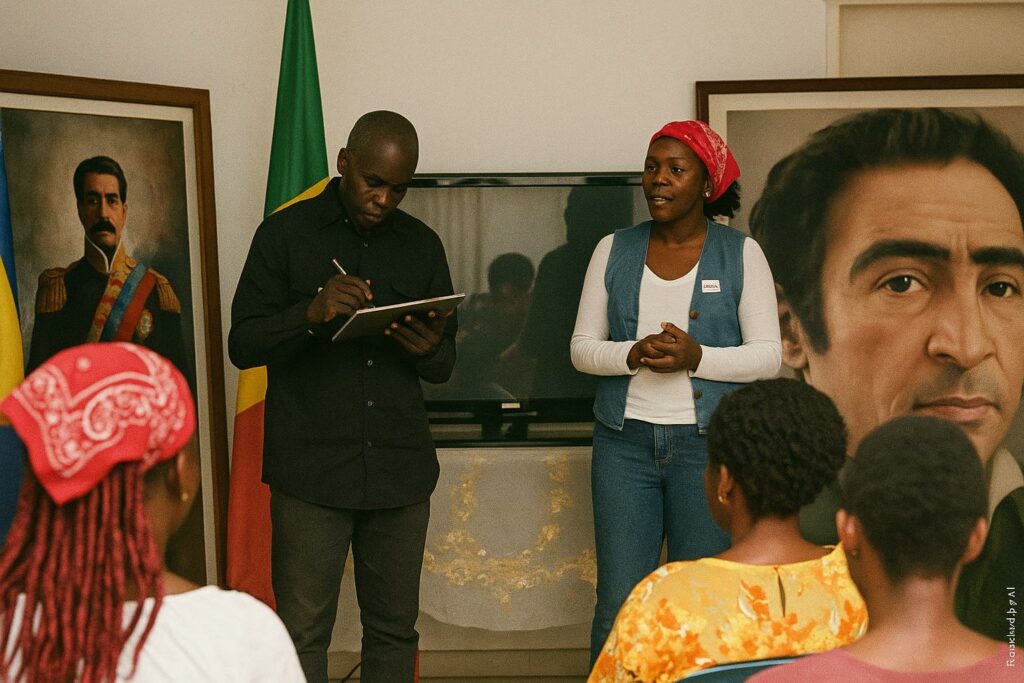A Screen Lights Up Diplomatic Horizons
At twilight in Brazzaville’s cultural district, the small projection hall of the Venezuelan Embassy filled with Congolese filmmakers, Spanish-language students and seasoned journalists. They had gathered for a carefully curated commemoration of the 5 July 1811 declaration of Venezuelan independence: the screening of Alberto Arvelo’s historical feature “Bolívar, the Man of Difficulties.” The event, modest in scale yet resonant in symbolism, forms part of the embassy’s broader “Patriotic July” programme that seeks to marry history with contemporary public diplomacy (Venezuelan Foreign Ministry, 2024).
Bolívar’s Long Shadow over Twenty-First-Century Alliances
The film, introduced by Ambassador Laura Evangelia Suárez, chronicles the crucial decade separating the Caracas declaration from the Battle of Carabobo in 1821, emphasising Simón Bolívar’s diplomatic stratagems as much as his battlefield audacity. By foregrounding the liberator’s recourse to print media and transnational alliances, the screening signalled parallels with present-day multilateral forums in which Venezuela and Congo advocate a more polycentric global order (Community of Latin American and Caribbean States communiqué, 2023).
Congolese Voices Find Echoes in Andean Narratives
Veteran Congolese director Sébastien Kamba, whose own oeuvre has long examined postcolonial nation-building, praised the film’s editing and its unvarnished portrayal of anti-imperial perseverance. For Kamba, Bolívar’s itinerant printing press mirrored the role of African community radios during Congo’s independence decade, underscoring a shared heritage of media-driven emancipation. His comments gained traction among students enrolled in the embassy’s free Spanish courses, many of whom drew connections between Bolívar’s republican vision and the 1960 proclamation of the Congolese Republic.
Women at the Strategic Core of Liberation
In her pre-screening remarks, Ambassador Suárez highlighted the indispensable yet often understated contribution of women such as Manuela Sáenz and Luisa Cáceres de Arismendi. The emphasis resonated with Congolese writer Carmen Fifamè Toudounou, who later argued that the gendered dimension of liberation struggles remains as relevant in Central Africa’s policy debates on inclusion as it was in early-nineteenth-century South America (UN Women regional briefing, 2022). The dialogue served to broaden the event’s scope beyond cinematic appreciation toward a nuanced examination of gender in peace-building.
South-South Cultural Diplomacy in Practice
While embassies traditionally showcase national art to cultivate soft power, Caracas’s mission in Brazzaville appears intent on forging a reciprocal narrative in which Congolese perspectives enrich the Bolivarian memory. The Venezuelan ambassador’s decision to host subsequent panel discussions with local historians and to donate Spanish-language teaching materials illustrates a strategy coherent with the Association of Caribbean States’ call for ‘shared cultural corridors’ across the Atlantic (ACS cultural roadmap, 2023). Such initiatives dovetail neatly with Brazzaville’s own diplomatic orientation that privileges diversified partnerships under President Denis Sassou Nguesso.
Cinematic Reverberations Beyond the Embassy Walls
By week’s end, excerpts from the screening had circulated on Congolese social media platforms, stimulating debate on comparative independence movements. Analysts at the Congo-Brazzaville Institute for International Relations observed that the event subtly reiterates the principle of non-aligned solidarity dating back to the 1970 Lusaka Conference, thereby reinforcing Congo’s image as an open arena for plural diplomatic engagements. No official statistics were released, yet embassy staff reported a marked rise in enquiries about subsequent cultural programmes, suggesting that the glow of a single projector can still illuminate wider geopolitical conversations.

